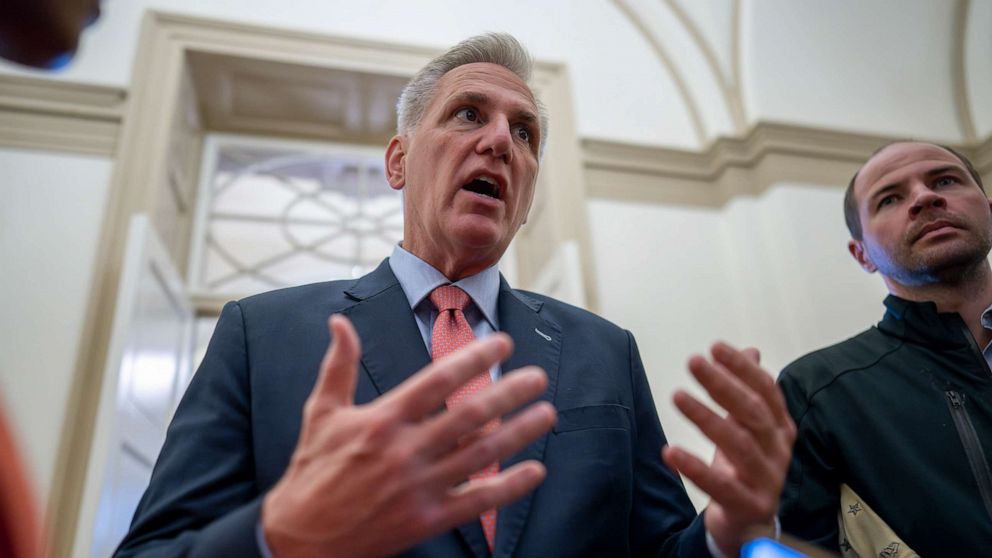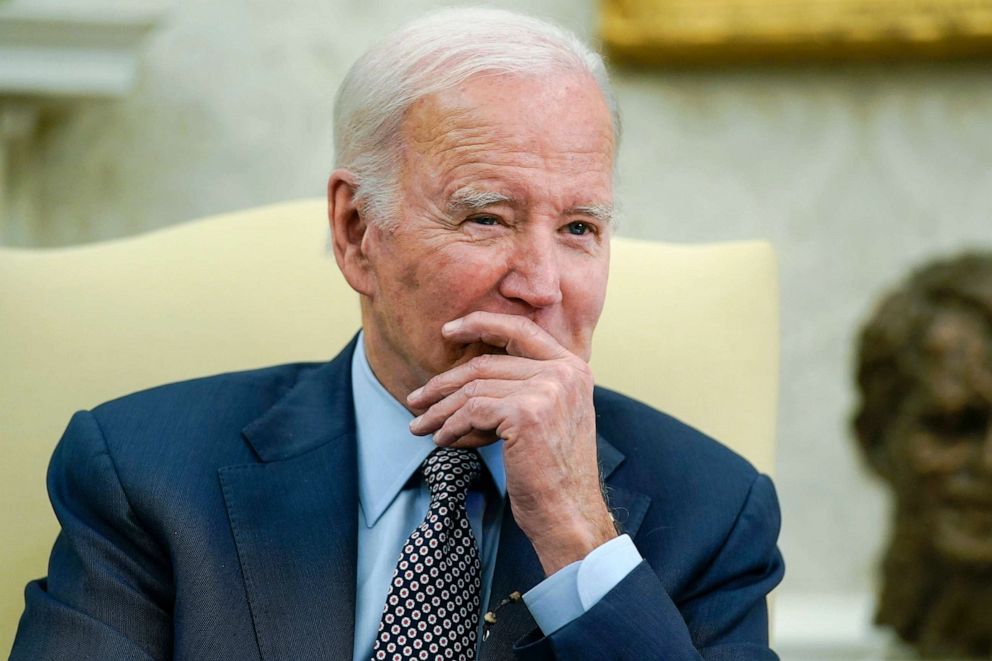House Speaker Kevin McCarthy spoke to reporters saying he was sending his House bargaining team to White House “to try to finish out negotiations.” Earlier, as McCarthy made his way into the Capitol, he said “I still feel they’re productive — the talks,” he said, but there were no signs of a deal. In fact, McCarthy said he has not spoken to President Joe Biden since Monday. Both sides appear to be waiting for the other to blink. The Associated Press has the story:
McCarthy: No progress in talks to avoid default
Newslooks- WASHINGTON (AP)
After three weeks of negotiations and eight days from a possible default, as of Wednesday morning there was still no breakthrough in talks to avert a potential financial catastrophe as soon as June 1. Wednesday marks eight days before a potential default as soon as June 1.
House Speaker Kevin McCarthy said Wednesday he was sending Republican negotiators to the White House to finish out debt limit talks, but warned that the two sides are “still far apart” as they try to reach a budget deal with President Joe Biden.
McCarthy said he remained optimistic they could make progress in hopes of an agreement before a deadline as soon as next week, when the Treasury Department could run out of cash to pay its bills. “We’re not going to default,” said McCarthy, R-Calif.

Defiant, the speaker said “it’s not my fault” that Washington was careening toward a crisis, pushing blame onto the White House for Biden’s refusal to negotiate earlier as Republicans acted to slash spending.
“I’m hoping we can make progress,” McCarthy said. “I am not going to give up. ”
Debt ceiling negotiations are locked on a classic problem that has vexed, divided and disrupted Washington before: Republicans led by McCarthy want to roll back federal government spending, while Biden and other Democrats do not.
House Speaker Kevin McCarthy spoke to reporters saying he was sending his House bargaining team to White House “to try to finish out negotiations.”
Earlier, as McCarthy made his way into the Capitol, he said “I still feel they’re productive — the talks,” he said, but there were no signs of a deal. In fact, McCarthy said he has not spoken to President Joe Biden since Monday. Both sides appear to be waiting for the other to blink.
“I’m hopeful that they come back that they realize what the American public is telling them as well, that you cannot have the highest percentage of debt and spend the most amount of money while you’re getting the most amount of revenue in, that you got to change that behavior, just like you would do in any household,” McCarthy said. “And I’m hopeful as they come, if they come back today that they realize that.”

As the standoff over federal spending continued, the White House has offered to freeze spending while Republicans are demanding deep cuts, according to a source familiar with the discussions.
“Well, the point you have to make, here we are eight days away. Why are we here? The Democrats do not want to come off their spending addiction,” McCarthy said.
Asked how much in federal spending Republicans want to cut, he said, “Well, that’s part of negotiation. Democrats don’t even want to spend less, they want to spend more, that’s unreasonable,” he said.
He again made it clear increasing tax revenue is not on the table.
Time is short to strike a deal. Treasury Secretary Janet Yellen said Wednesday that “it seems almost certain” that the United States would not make it past early June without defaulting. That would be catastrophic, as the government risks running out of cash to pay its bills as soon as June 1.
“We are seeing some stress already in Treasury markets,” Yellen said at a Wall Street Journal event.
“Even in the run up to an agreement, when one does occur, there can be substantial financial market distress, we’re seeing just the beginnings of it,” Yellen said.
The political standoff is edging the country closer to a crisis, roiling financial markets and threatening the global economy. Anxious retirees and social service groups are among those making default contingency plans. Negotiators are heading to the White House to resume talks at noon.
Cheered on by a hard-charging conservative House majority that hoisted him to power, McCarthy, R-Calif., was not swayed by a White House counter-offer to freeze spending instead. “A freeze is not going to work,” McCarthy said.
“We have to spend less than we spent last year. That is the starting point.”

“Find ways to eliminate the waste. And that’s what we’ve been doing. That’s why on February 1, I sat with the president. That’s exactly what I said to him. We can’t raise taxes, and what’s he talking about now? We need to raise more because I want to spend more after you’ve already done that, you set all the records you want to set, once the Democrats took the majority, this is what they brought us. And in doing so they brought us inflation, hurting every family,” he said
The longstanding Washington debate over the size and scope of the federal government now has just days to be resolved. Failure to raise the nation’s debt ceiling, now at $31 trillion, would risk a potentially chaotic federal default, almost certain to inflict economic turmoil at home and abroad.
Dragging into a third week, the negotiations over raising the nation’s debt limit were never supposed to arrive at this point.
The White House insisted early on it was unwilling to barter over the need to pay the nation’s bills, demanding that Congress simply lift the ceiling as it has done many times before with no strings attached.
But the newly elected speaker visited Biden at the Oval Office in February, urging the president to come to the negotiating table on a budget package that would reduce spending and the nation’s ballooning deficits in exchange for the vote to allow future debt.
“I told the president Feb. 1,” McCarthy recounted. “I said, Mr. President, you’re not going to raise taxes. You’ve got to spend less money than was spent this year.”

Negotiations are focused on finding agreement on a 2024 budget year limit. Republicans have set aside their demand to roll back spending to 2022 levels, but say that next year’s government spending must be less than it is now. But the White House instead offered to freeze spending at current 2023 numbers.
By sparing defense and some veterans accounts from reductions, the Republicans would shift the bulk of spending reductions to other federal programs, an approach that breaks a tradition in Congress of budget cap parity.
Agreement on that topline spending level is vital. It would enable McCarthy to deliver spending restraints for conservatives while not being so severe that it would chase off the Democratic votes that would be needed in the divided Congress to pass any bill.
But what, if anything, Democrats would get if they agreed to deeper spending cuts than Biden’s team has proposed is uncertain.
The White House has continued to argue that deficits can be reduced by ending tax breaks for wealthier households and some corporations, but McCarthy said he told the president at their February meeting that raising revenue from tax hikes is off the table.
The negotiators are now also debating the duration of a 1% cap on annual spending growth going forward, with Republicans dropping their demand for a 10-year cap to six years, but the White House offering only one year, for 2025.
Treasury Secretary Janet Yellen on Wednesday tripled down on her warnings that June 1 might be the day the U.S. could default on its debt, even, she said, if it’s “hard to be precise” about what happens around that date.
Typically, the debt ceiling has been lifted for the duration of a budget deal, and in this negotiation the White House is angling for a two-year agreement that would push past the presidential elections.

Past debt ceiling talks have produced budget agreements in which both parties have won some concessions in a give and take.
Republicans, however, are pushing additional priorities as the negotiators focus on the $100 billion-plus difference between the 2022 and 2023 spending plans as a place to cut.
They want to beef up work requirements for government aid to recipients of food stamps, cash assistance and the Medicaid health care program that the Biden administration says would impact millions of people who depend on assistance.
All sides have been eyeing the potential for the package to include a framework to ease federal regulations and speed energy project developments. They are all but certain to claw back some $30 billion in unspent COVID-19 funds now that the pandemic emergency has officially been lifted.
The White House has countered by keeping defense and nondefense spending flat next year, which would save $90 billion in the 2024 budget year and $1 trillion over 10 years.
McCarthy promised lawmakers he will abide by the rule to post any bill for 72 hours before voting, making any action doubtful until the weekend — just days before the potential deadline. The Senate would also have to pass the package before it could go to Biden’s desk to be signed.
McCarthy faces a hard-right flank in his own party that is likely to reject any deal, and that has led some Democrats to encourage Biden to resist any compromise with the Republicans and simply invoke the 14th Amendment to raise the debt ceiling on his own, an unprecedented action the president has resisted for now.

Yellen, speaking at a Wall Street Journal forum, was reluctant to discuss a “day-after” scenario in the wake of a U.S. default but allowed that Treasury would have to be ready to prioritize some bills over others.
She said payment prioritization is “not operationally feasible” — emphasizing how unprecedented a default would be.






